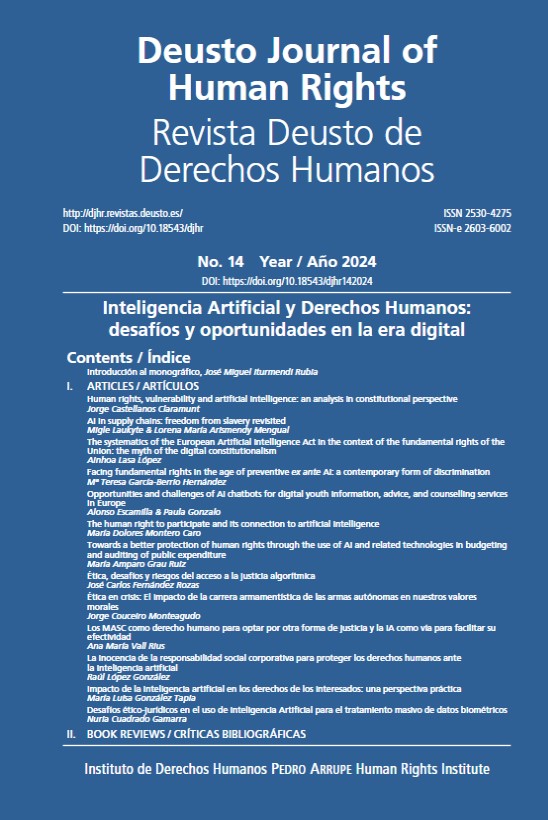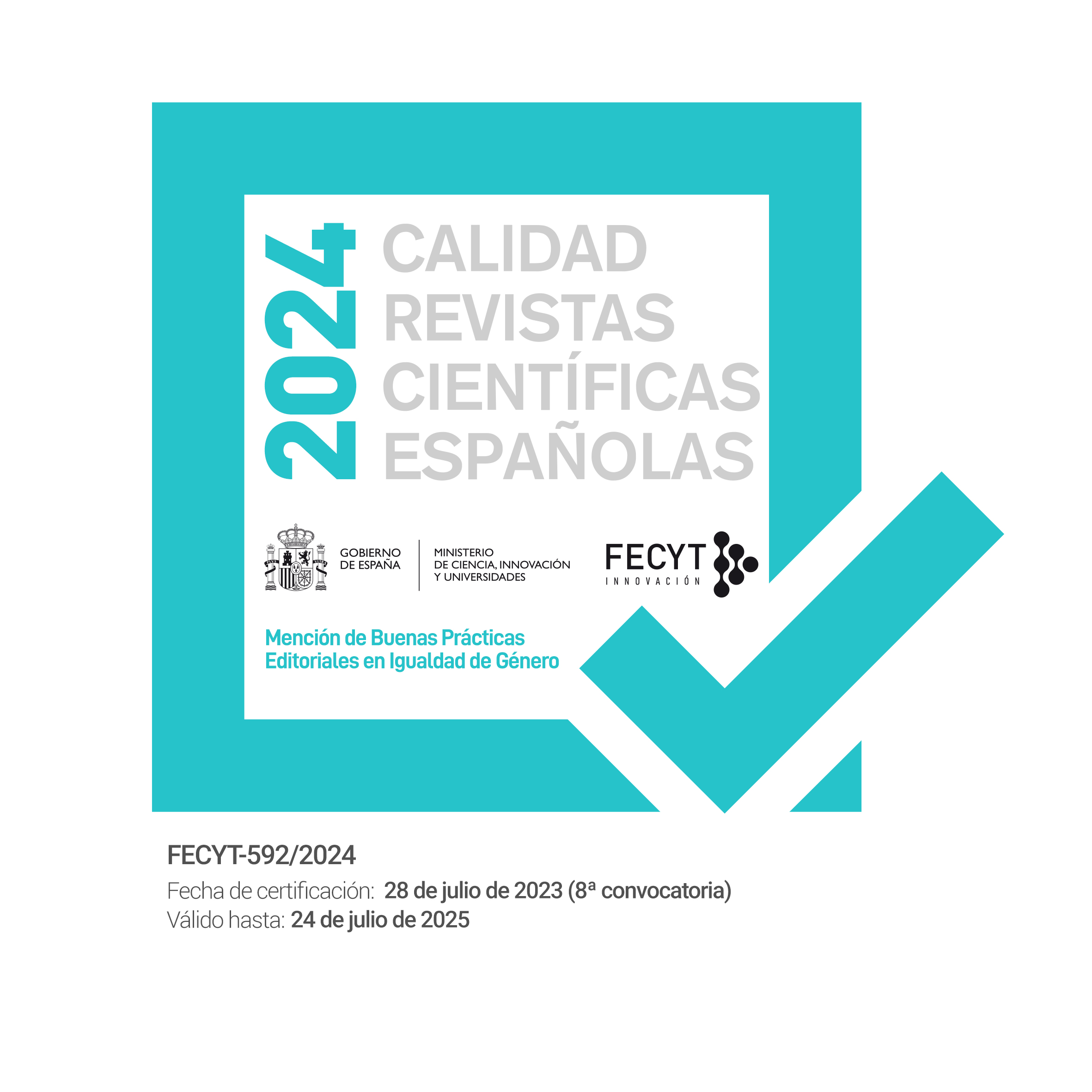The candor of corporate social responsibility to safeguard human rights from artificial intelligence
Abstract
Ethics, philosophy and science have allowed humanity to solve the most complex challenges throughout its history. Human dignity is the ultimate goal of a civilization, both the Renaissance and the Enlightenment synthesize the best of science and thought. For science and human dignity came nuclear energy, genetics, digitalization, neuroscience and cognitive computing, which today move human civilization towards the fourth industrial revolution. In human dignity, it is imperative to recognize the authentic legacy of Adam Smith. His greatest critics have not read his theory of moral sentiment, and his greatest defenders discredit that Smith was first and foremost a humanist, then an economist. The most seasoned managers will embrace a capitalism committed to human dignity, without complexes. This essay links capitalism and technology, to extol privacy and decent work.
Received: 30 May 2024
Accepted: 07 September 2024
Downloads
References
Alden, Eric. 2011. «Shareholder activism by public pension funds and the rights of dissenting employees under the First Amendment», Harvard Journal of Law & Public Policy 34: 289-366.
Aristóteles. n.d. Ética a Nicómaco. Barcelona: Orbis.
Bacon, Francis y Matthew Thompson. 1928. Selections. Acceso el 1 de Octubre de 2024. https://books.google.com/books?id=I4c3AAAAMAAJ.
Bai , Xuezhu y William Roberts. 2011. «Taoism and its model of traits of successful leaders», Journal of Management Development 30 (7/8): 724-739.
Benhabib, Seyla. 2004. The rights of others: Aliens, residents, and citizens. Cambridge: Cambridge University Press.
Blanco Brotons, Francisco José. 2023. «El idealismo discursivo en la teoría de la justicia: una crítica a Rainer Forst». Cuadernos salmantinos de filosofía 50: 247-268.
Connolly, William E. 2002. Neuropolitics: Thinking, culture, speed, NED-New edition 23. Acceso el 16 de abril de 2024. https://jstor.org/stable/10.5749/j.cttts8p6.
D´Angour, Armand. 2022. Aristóteles, el arte de innovar. Badalona: Kõan.
Etxeberria, Xabier. 1998. Ética básica. Bilbao: Universidad de Deusto.
Ey, Henri. 1967. La conciencia. Madrid: Gredos.
Farrington, Benjamin. 1971. Francis Bacon, filósofo de la Revolución Industrial. Madrid: Ayuso.
Franck, Thomas. 2019. «Facebook is downgraded as analyst warns its executive exodus could be contagious». CNBC, marzo 18.
Freud, Sigmund, Ramon Rey Ardid y Luis López-Ballesteros. 1973. El yo y el ello. Madrid: Alianza.
Helbing, Dirk. 2015. «Societal, economic, ethical and legal challenges of the digital revolution: from big data to deep learning, artificial intelligence, and manipulative technologies», Arxiv. https://doi.org/10.48550/arXiv.1504.03751.
Kholberg, Lawrence. 1958. Kohlberg’s original study of moral development («The development of modes of thinking and choices in years 10 to 16»). New York: Garland Publishing.
Koide-Majima, Naoko, Shinji Nishimoto y Kei Majima. 2024. «Mental image reconstruction from human brain activity: Neural decoding of mental imagery via deep neural network-based Bayesian estimation.» Neural Networks 170: 349-363.
Lanteri, Alessandro. 2021. «Strategic drivers for the fourth industrial revolution», Thunderbird International Business Review 63 (3): 273-283. https://doi.org/10.1002/tie.22196.
López Rojas, José. 2024a. «Inteligencia artificial: Reconfigurando el paradigma financiero del siglo XXI», III Encuentro Nacional e Internacional de Contabilidad y Fiscalidad. Rionegro, Antioquia. 8.
López Rojas, José. 2024b. «Tras la llegada de la IA, ¿caerá el invierno sobre el mercado de trabajo?». The Conversation, 30 de abril.
Martín Loeches, Manuel, Pilar Casado y Alejandra Sel. 2008. «La evolución del cerebro en el género Homo: la neurobiología que nos hace diferentes». Revista de Neurología 46 (12): 731-741.
Mèlich, Joan-Carles. 2013. Ética de la compasión. Barcelona: Herder.
Mirandola, Giovanni Pico della. 1978. Discurso sobre la dignidad del hombre. Buenos Aires: Goncourt.
Miratvilles, Luis. 1969. Visado para el futuro. Madrid: Salvat.
Mitcham, Carl. 1989. ¿Qué es la filosofía de la tecnología? Barcelona: Antrophos.
Naciones Unidas. 2024. Human Development Index. Acceso el 12 de mayo de 2024. https://hdr.undorg/.
NBCNews. 2018. ‘I’m sorry’: Facebook CEO Mark Zuckerberg delivers opening statement at senate hearing. abril 18. Acceso el 15 de mayo de 2024. https://www.youtube.com/watch?v=UofMQ8EGmSc.
Nowotny, Helga. 2014. La curiosidad insaciable. Barcelona: UOC. Acceso el 15 de mayo de 2024. https://lectura.unebook.es/viewer/9788490291122.
Porter, Michael E. 1979. «How competitive forces shape strategy», Harvard Business Review 57 (2): 137–145.
Punset, Eduard. 2007. El alma está en el cerebro. Barcelona: Destino.
Savater, Fernando. 1992. «Vitalismo», en Concepciones de la ética, editado por Victoria Camps, Osvaldo Guariglia y Fernando Salmerón, 297-308. Madrid: Trotta.
SEC. 2024. United States. Securities and exchange commission. abril 24. Acceso el 12 de mayo de 2024. https://www.sec.gov/ix?doc=/Archives/edgar/data/1326801/000132680124000012/meta-20231231.htm.
Sellars, Wilfrid. 1956. Empiricism and the philosophy of mind. Cambridge Massachusetts: Harvard University Press.
Shleifer, Andrei. 2004. «Does competition destroy ethical behavior?.» American economic review 94 (2): 414-418.
Smith, Adam. 1723-1790. The theory of moral sentiments / Adam Smith ; Introduction by Amartya Sen ; edited with notes by Ryan Patrick Hanley. New York: Penguin Group.
Spinoza, Benedictus de. 2019. Tratado teológico-político. Madrid: Verbum. Acceso el 12 de mayo de 2024. http://www.digitaliapublishing.com/a/63862/.
Ted Tschang, Feichin y Esteve Almirall. 2021. «Artificial intelligence as augmenting automation: Implications for employment». Academy of Management Perspectives, 35 (4): 642-659.
Voltaire. 1977. Tratado de la Tolerancia. Barcelona: Crítica.
Young, Iris Marius. 2011. Responsabilidad por la justicia. Madrid: Morata. Paideia Galiza Fundación.
Yum, June Ock. 1988. «The impact of Confucianism on interpersonal relationships and communication patterns in East Asia.» Communication Monographs 55 (4): 374-388. https://doi.org/10.1080/0393637758809376178.
Deusto Journal of Human Rights / Revista Deusto de Derechos Humanos is an Open Access journal; which means that it is free for full and immediate access, reading, search, download, distribution, and reuse in any medium only for non-commercial purposes and in accordance with any applicable copyright legislation, without prior permission from the copyright holder (University of Deusto) or the author; provided the original work and publication source are properly cited (Issue number, year, pages and DOI if applicable) and any changes to the original are clearly indicated. Any other use of its content in any medium or format, now known or developed in the future, requires prior written permission of the copyright holder.



3.jpg)
3.jpg)
3.jpg)
.jpg)








